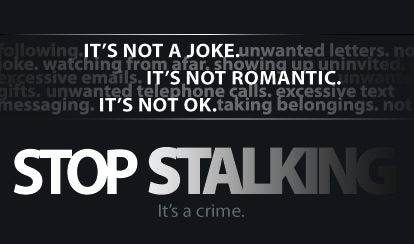In its 10th anniversary, National Stalking Awareness Month is continuing to empower those affected by stalking with important information regarding prevention, acknowledgment and resources about the crime. Because stalking, like domestic violence, is a crime of power and control, Hubbard House, the domestic violence center serving Duval and Baker counties in Northeast Florida, wants you to be aware that it can happen to you and how to prevent it.
So you may be thinking…
“I don’t know if I am being stalked.”
10 ways to know if you are being stalked
- Lurking around your workplace or your neighborhood. An occasional meeting with the same person could be a happy accident, but repeated meetings could mean that they are stalking you.
- Being watched. This can include them taking pictures of you, asking your friends about you and even hiring a private detective to find out all they can about your personal life.
- Repeated phone calls. This can include them hanging up upon your answer or silent messages left on your answering machine.
- Inappropriate gifts.
- Finding yourself in the position of needing to be rescued. Let’s say on the way to work your car stalls, but this time it’s not a desperate attempt to save money by riding as far as you can with the gas light on, you just filled up yesterday. A stalker may set up a situation like this to be able to be the hero. While some “heroes” can be genuine, it is better to be cautious with someone you don’t know.
- Manipulation. Some stalkers may be so desperate for your attention that they will threaten to harm themselves or others if you don’t return their affection.
- Internet stalking. Internet stalking has become more popular with the growth of social media. Be careful what information you share, such as your address, phone number, and of course, your social security number.
- Defamation of character or insults. These negative statements may prompt you to withdraw yourself from the public eye. That is exactly what stalkers want; they want to isolate you.
- Violence. Any unwanted form of physical contact is a form of violence. Report it.
- Cumulative unwanted contact of any kind.
You don’t have to have all of these incidents happen to you for it to be considered stalking. Even just one of these signs may mean you are being stalked, and are at risk. If you are experiencing any, or all of these warning signs, contact your local police and put an end to it right away.
“It’s not a big deal.” or “It’s just my jealous ex, they’re harmless.”
But it is a big deal! According to recent research stalking often leads to homicide. These studies show that 76% of women murdered, were stalked by the person who killed them. According to National Institute of Justice Centers for Disease Control and Prevention, there is also a strong correlation between stalking and other forms of violence:
- 81% of women who were stalked by a current or former husband or cohabiting partner were also physically assaulted by that partner.
- 31% were sexually assaulted by that partner.
“How do I deal with someone stalking me?”
Some safety tips suggested by the Stalking Resource Center are:
- Treat all threats, direct and indirect, as legitimate and inform law enforcement immediately.
- Vary your routines. This includes varying routes to work, school, the grocery store, and other places regularly frequented.
- When out of the house or work environment, try not to travel alone and try to stay in public areas.
- Get a new phone number, but leave the old number active and connected to an answering machine or voicemail. Save any messages from the stalker. These messages can be critical evidence for law enforcement to build a stalking case against the offender.
- Do not interact with the person stalking or harassing you, this may reinforce their behavior.
- Consider obtaining a restraining order.
- Trust your instincts. If you’re somewhere that doesn’t feel safe, either find ways to make it safer, or leave.
You can visit the websites below for more resources about stalking, or if you feel as though you are being stalked call the hotline number listed to speak to someone immediately. If you feel like you are in immediate danger please call the police.
Stalking Resources:
- www.victimsofcrime.org
- www.thehotline.org or 1-800-799-7233
- www.stalkingawarenessmonth.org
“How do I prevent this from happening to me?”
- Knowledge is power. Take this quiz to see how much you really know about stalking.
- View this video for ways to protect yourself from a stalker.
Stalking is dangerous and shouldn’t be taken lightly. Don’t let it become a problem in your life. Put these ways to protect yourself in effect and get help if you feel you are being stalked or harassed in any way.
If you or someone you know is in an abusive relationship please call the Hubbard House 24-hour domestic violence hotline at (904) 354-3114 or (800) 500-1119. Hubbard House can help.
ABOUT HUBBARD HOUSE: Founded as the first domestic violence shelter in Florida in 1976, Hubbard House is a certified, comprehensive domestic violence center providing programs and services to more than 5,000 women, children, and men annually in Duval and Baker counties. While Hubbard House is most known for its emergency shelter, the agency also provides extensive adult and youth outreach services, school-based education, therapeutic childcare, batterers’ intervention programs, court advocacy and volunteer and community education opportunities. Visit www.hubbardhouse.org to learn more.
By Hannah Johnson

